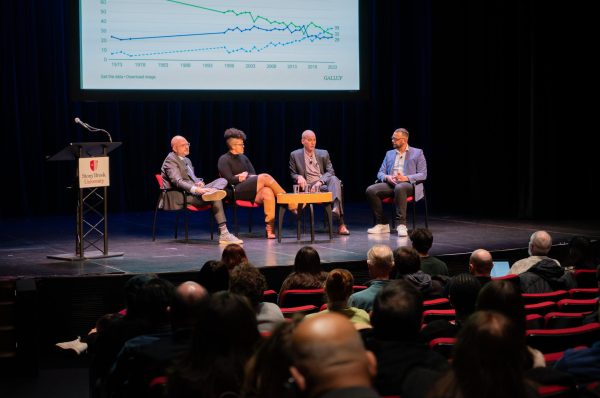
On Thursday, Feb. 22, Stony Brook University’s School of Communication and Journalism (SoCJ) hosted a panel discussion with the Office of Diversity, Inclusion and Intercultural Initiatives that covered how journalists and news outlets can best report on the upcoming 2024 presidential election at a time of great polarization in the United States.
Panelists included Jane Coaston, New York Times opinion writer, Matt Yglesias, publisher of Slow Boring and co-founder of Vox Media and, James Bennett, a senior editor at The Economist. Musa al-Gharbi, an assistant professor in the SoCJ, moderated the discussion.
One of the first topics the panelists discussed was the struggles facing the media industry, most notably a large decrease in both trust from the public and revenue — and how these challenges would affect the reporting surrounding the 2024 presidential race.
“It’s challenging even to use terms like ‘the media,’” Coaston said. “Because the number of people who tell me that they don’t trust The New York Times, but then they will tell me something they got from a media outlet, and it’s just like gateway pundit, conspiratorial. So they trust a media outlet, they just don’t trust my media outlet.”
Coaston also pointed out that the divided nature of media outlets prompts news consumers to seek out organizations whose reporting closely aligns with their own beliefs, reinforcing their ideas and making it more difficult for them to be exposed to new ones.
Yglesias argued that many journalists at large news organizations tend to be left-leaning, something that further lowers trust in media outlets.
“[The] perception, which is accurate, is that if you went through the hallways of those institutions and asked random people, what do you think about politics? They are mostly on the left,” he said.
The panelists also discussed the implications of focusing coverage on presidential candidate Donald Trump, both editorially and financially.
During Trump’s 2016 campaign and subsequent time in office, news organizations were able to use him as a consistent source of coverage that was craved by viewers, leading to an increase in revenue for outlets. This phenomenon, coined the “Trump Bump,” led to an increase in monetary gain in the forms of advertising and subscriptions for publications. However, following his departure from office, that surge disappeared.
Outlets considered to be left-leaning lost a total of 16.7% of their web traffic following Trump’s departure from office, with Mother Jones losing 47.4%. Outlets considered to be right-leaning suffered as well, with Newsmax and Fox News both losing over 20% of their web traffic, according to Axios. Similarly, The Washington Post lost half a million subscribers in the first two years of President Joseph Biden’s presidency.
“The coverage of Trump was the most intense of any president on record,” al-Gharbi said during the panel. “In 2018, [Trump] was the 3rd most used word in The New York Times if you filter out ‘and,’ ‘but,’ ‘there,’ etc.”
Meanwhile, Coaston made the point that properly covering Trump could be a difficult task because he routinely makes statements that would be considered out of the ordinary when compared to other government officials.
“He has set a bar of lunacy that is very high,” Coaston said. “And when he says something that sounds insane, I think there is really a tendency in some ways to undercover it. If Joe Biden said that he’d really like to be a dictator for one day if he was elected, or that [members] of the lamestream media would be thoroughly scrutinized … it would be really weird, and people would cover it in a very different way.”
The panelists also touched on Biden’s avoidance of news media outlets in comparison to past presidents. According to The New York Times, he has held the least amount of news conferences of any president since Ronald Reagan.
“Joe Biden has a very particular issue because now these concerns about his agility, about his ability to think on his feet … is a real indictment of all of us, and how our expectations of the presidency have changed,” Bennett said.
Bennett elaborated that many previous presidents had built up reputations for communicating frequently through the news media. He noted how Biden has moved away from that precedent by not communicating with the media as often as his predecessors. Biden has yet to give interviews to major news outlets, including The Washington Post and The New York Times.
The event wrapped up shortly after. Yglesias expressed gratitude toward al-Gharbi, the moderator, for bringing the panelists together.
“He’s great,” Yglesias said after the event. “I trusted him, he put together a great event and [brought] all the panelists. I hope people liked it. It’s hard to tell in any panel discussion like this.”











